I had a small box full of USB cables that I did not know if they were good or not after use. Those were taken out of use when they did not seem to work OK, and nothing is more annoying than unreliable USB charging cable.
I found this
3-In-1 Micro USB Type-C Data Mini USB Cord Cable Triad Tester Data Wire Fixture from eBay at reasonable price (around 10 Euros).
3-In-1 Micro USB Type-C Data Mini USB Cord Cable Triad Tester Data Wire Fixture Features:
Supported port: Type-C, Mini USB, Micro-USB
Indicator: Bee cue, indicator lights
Package size: approx. 11 * 7.5 * 2 cm/ 4.3 * 3.0 * 0.8 in
Package weight: 39g/ 1.4oz
1. This usb cable triad tester comes with three ports of type-c, mini usb, and micro-usb.
2. It is capable of capable of testing out open circuit, short-circuit, wire welding error and other problems of data wire.
3. Bee cue and indicator lights remind you of fault types.
4. Advanced chip makes sure precise measurement.
5. Multi-level protection ensures the stability and safety of testing.
This device itself has instructions in Chinese printed to the device, which would be nice if I could understand that language. Fortunately the product web page had instructions also in English.
Here is the device in package.
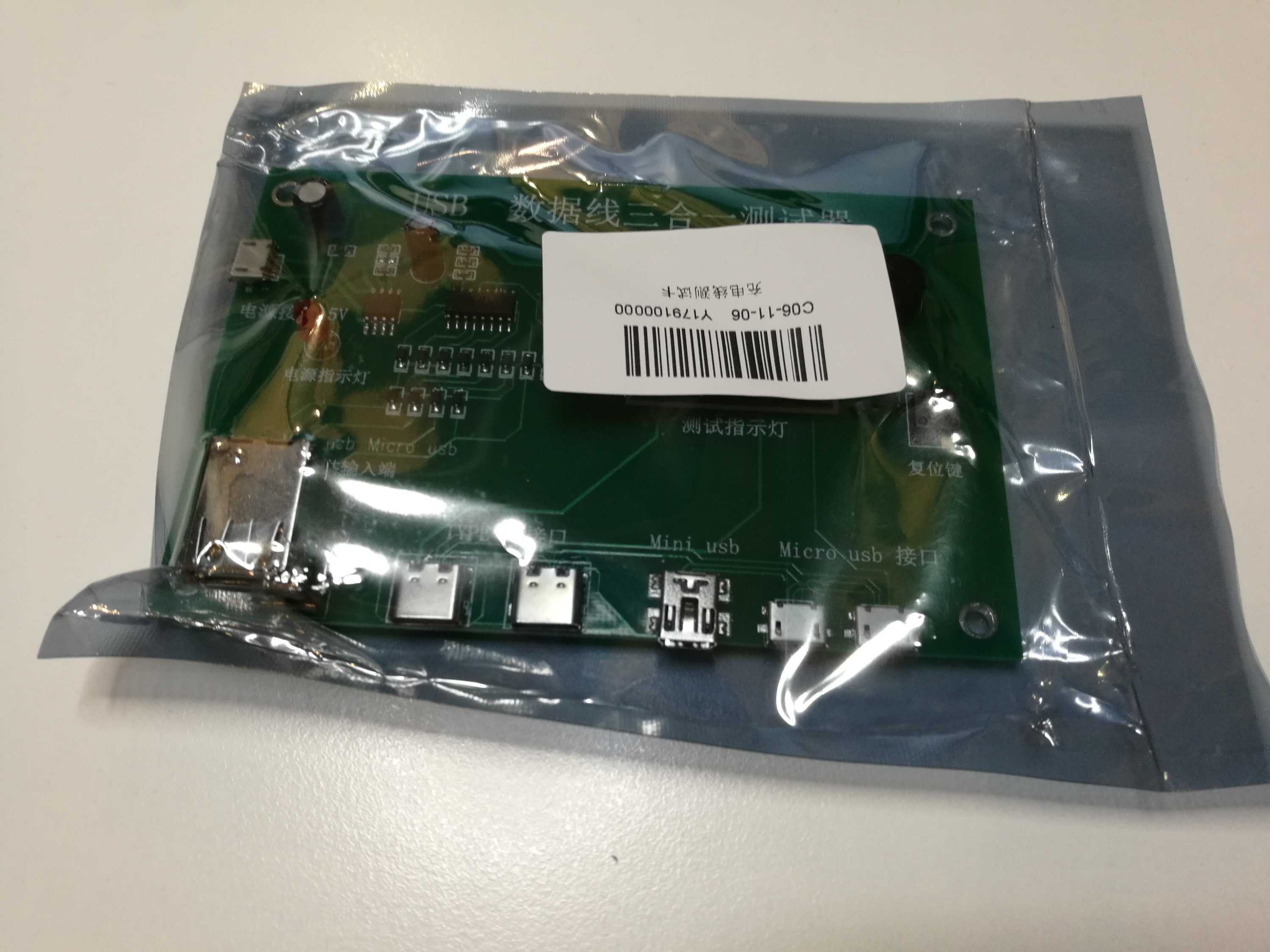
Here is picture of component and back sides of the circuit board.
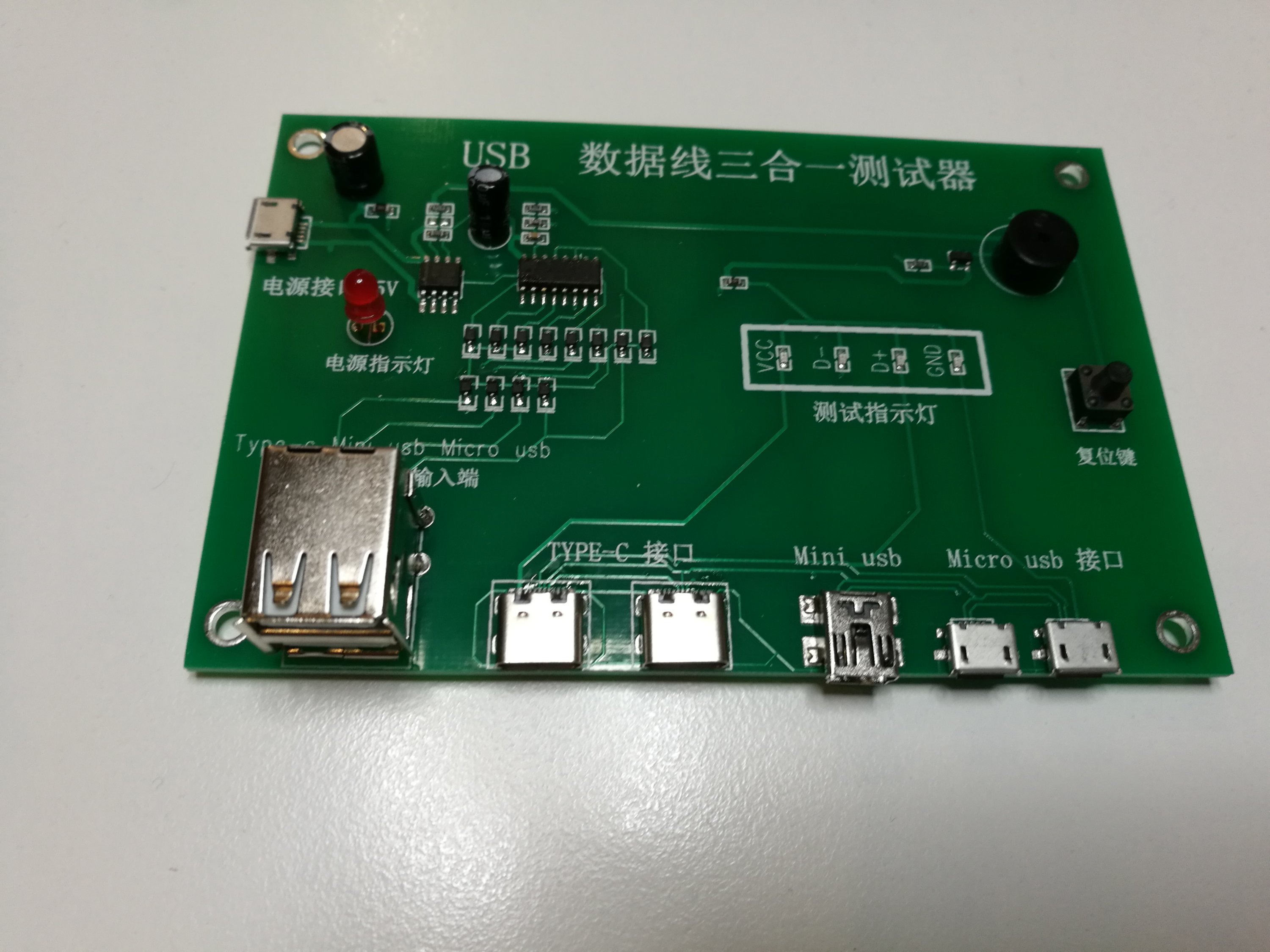
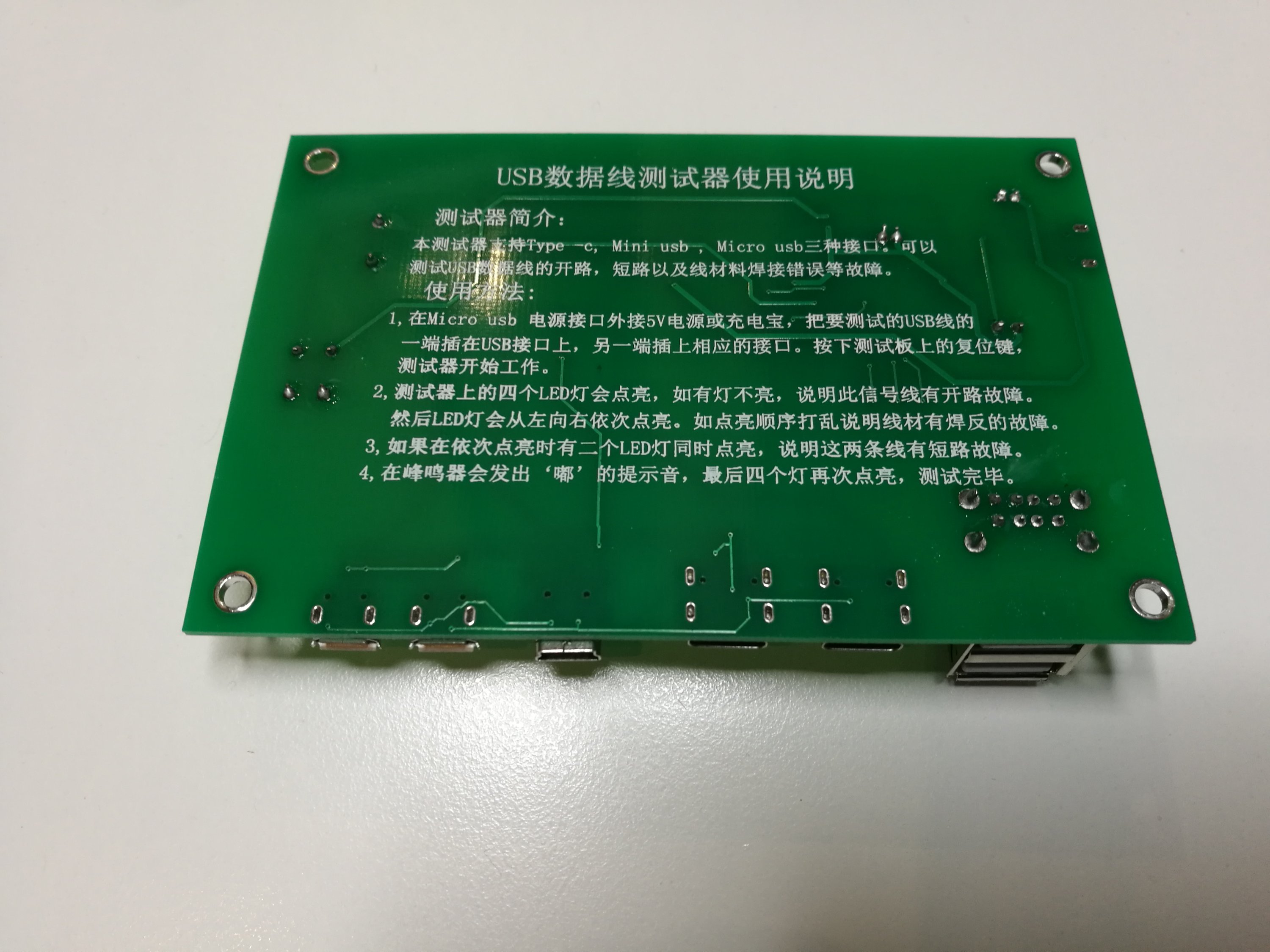
The device is powered with 5v from microUSB port. I powered it with a smart phone charger.
The tester works so that you connect the USB cable to be tested between USB A connection and to the connector that matches the other end of the cable being tested. After the cable is connected, you press the start button (only button on circuit board). After that the LEDs scan through all the wires (VCC, D+, D-, GND) in the USB cable separately and light the corresponding LED if everything is OK. Finally all the LEDs turn on the tester emits a short beep telling that testing is ready.
The board worked well for cable testing. I could quickly test half dozen USB cables to see if they were working or not.
I was few times wondering on some random beeps coming from board when moved, but that turned to be caused by short power breaks caused by moving the board and having unreliable microUSB feeding power to board. The problem was solved with working USB cable.
Circuit seems to be classic 555 timer + 4017 counter approach used in very many cable testers
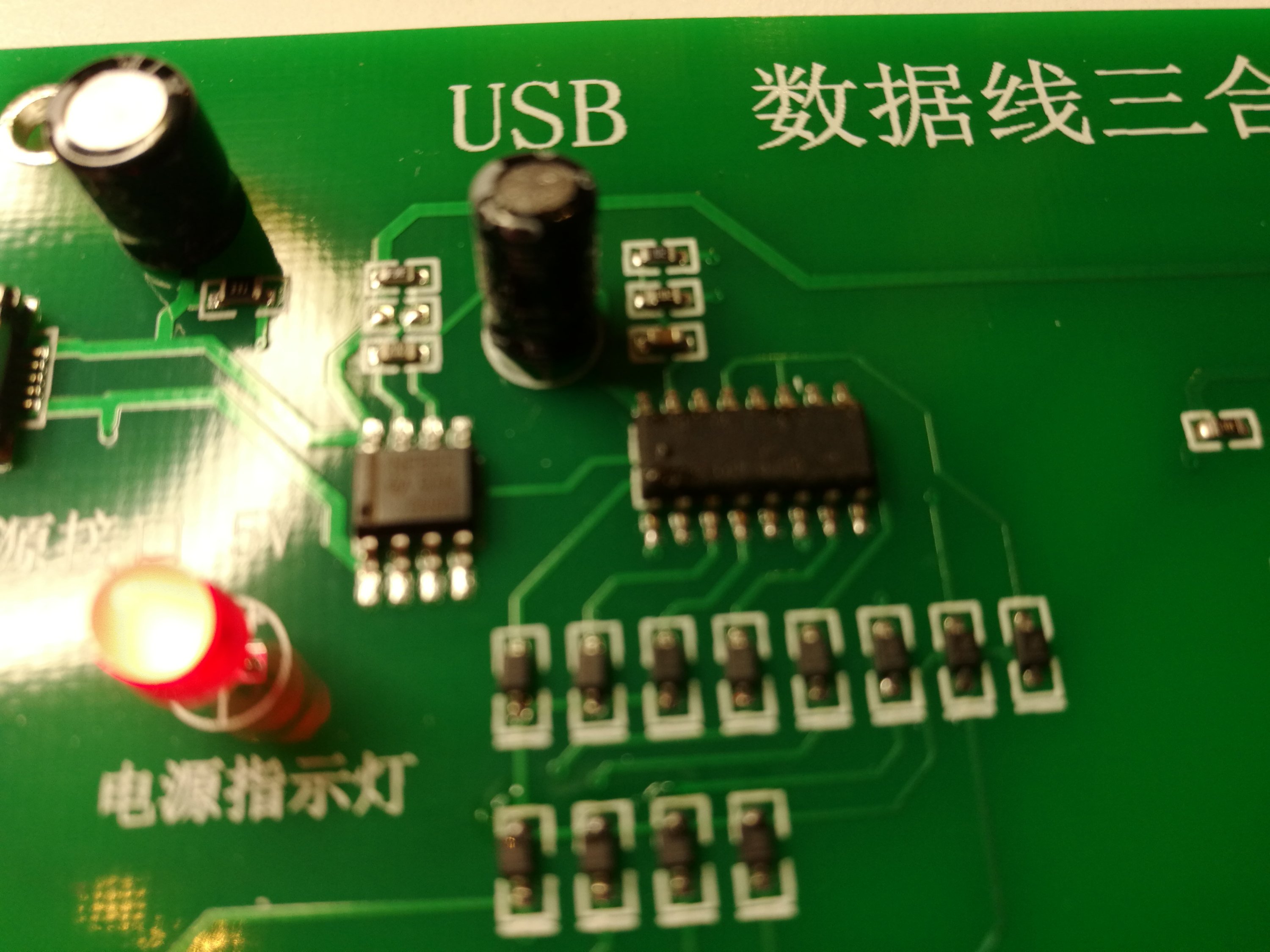
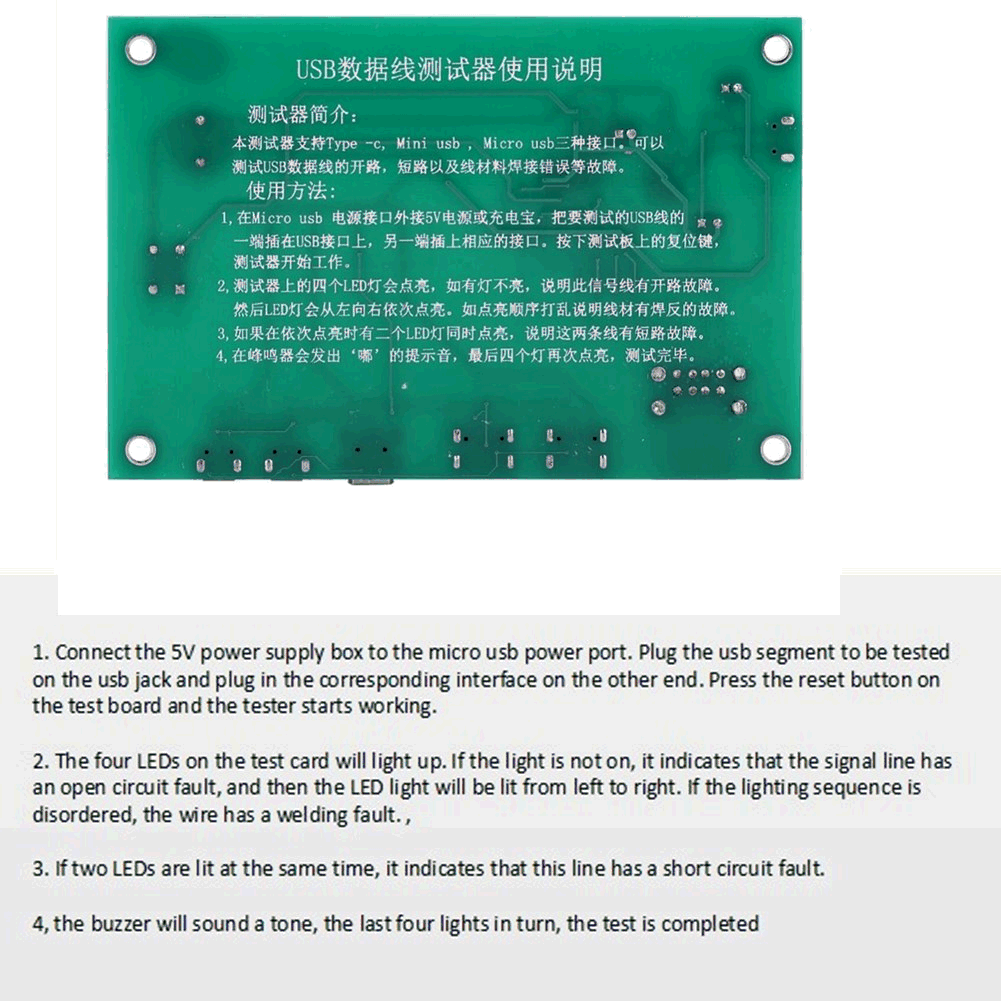
7 Comments
Tomi Engdahl says:
Handy Tools’ Cable Tester Offers Pocket-Size Testing for USB 2.0 Micro USB, Mini USB, Type-C Leads
https://www.hackster.io/news/handy-tools-cable-tester-offers-pocket-size-testing-for-usb-2-0-micro-usb-mini-usb-type-c-leads-a5a44d10c626
Designed for USB 2.0 cables with a range of connectors, this CR2032-powered tester offers quick and easy continuity checking.
Tomi Engdahl says:
An LED Matrix RJ45 Cable Tester
Ted Yapo’s tester shows cable connections on an 8×8 LED matrix
https://www.hackster.io/news/an-led-matrix-rj45-cable-tester-49bfdfdd743e
Tomi Engdahl says:
https://hackaday.com/2021/07/18/arduino-cable-tracer-helps-diagnose-broken-usb-cables/
Tomi Engdahl says:
A Handy OSHW USB Cable Tester For Your Toolkit
https://hackaday.com/2022/11/20/a-handy-oshw-usb-cable-tester-for-your-toolkit/
There’s no shame in admitting you’ve been burned by a cheapo USB cable — ever since some bean counter realized there was a few cents to be saved by producing “power only” USB cables, no hardware hacker has been safe. But with this simple tester from [Álvaro Prieto] in your arsenal, you’ll never be fooled again.
https://github.com/alvarop/usb_c_cable_tester
Tomi Engdahl says:
Álvaro Prieto’s Open Source Universal USB Tester Calls Time on Faulty, Mislabeled Cables
Powered by a coin cell, this handy tester checks “most of the things” to make sure your USB and Thunderbolt cables are wired up right.
https://www.hackster.io/news/alvaro-prieto-s-open-source-universal-usb-tester-calls-time-on-faulty-mislabeled-cables-48c80fadded2
Electrical engineer Álvaro Prieto has called time on faulty or mislabeled USB cables, building a dedicated testing board with a wide array of USB connector types — and releasing it as open hardware to help others sort out their junk drawers too.
“Ever wonder if your USB [Type-]C cable is USB2 or USB3? Do you have some charge-only cables hiding in a box just waiting for the right moment to spoil your project plans?! Fear no more,” Prieto writes of the project. “I’ve made a simple board to test most of the things!”
https://github.com/alvarop/usb_c_cable_tester/blob/main/ORDERING.md
Tomi Engdahl says:
USB C cable tester – C2C caberQU
https://www.tindie.com/products/petl/usb-c-cable-tester-c2c-caberqu/?utm_source=hackaday&utm_medium=link&utm_campaign=fromstore
What is it?
The C2C caberQU board applies a voltage to all pins of a cable and measures which ones are connected to the other end. It features LEDs for each of the 24 pins and even shield. So in total 25 LEDs offer all possible combinations for USB-C receptacle pin usage in different modes:
USB 2.0/1.1
USB Power Delivery
USB 3.0/3.1/3.2
Alternate Mode
Debug Accessory Mode
Audio Adapter Accessory Mode
Why did you make it?
The amount of possible USB C cable combinations is endless. If you use the wrong cable, data transmission may be slower than possible or certain devices may not work at all. In the USB C standard, the cable plays an important role and has to advertise itself as such. All of them need to have certain pins connected, some need to be grounded, some need to have resistors attached.
What makes it special?
Unfortunately there is no easy way to extract whether a certain cable can support a certain use case. If a cable has a broken pin, that makes it even worse, due to their unpredictable behavior. The C2C caberQU cable tester solves this once and for all. By flipping the USB connectors, the opposing LEDs for some pins light up due to them not being mirrored. That’s on purpose and defined in the USB C standard. The product is sold with one CR2032, the PCB and some basic instructions. The USB C cable is not included. You have to extract the needed pins for your desired usage on your own, unfortunately that can not be done universally for all possible combinations.
Tomi Engdahl says:
https://hackaday.com/2023/05/31/jitx-spits-out-handy-usb-cable-tester/